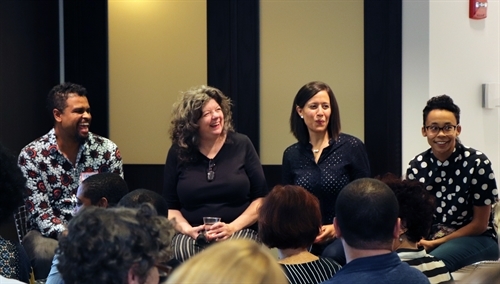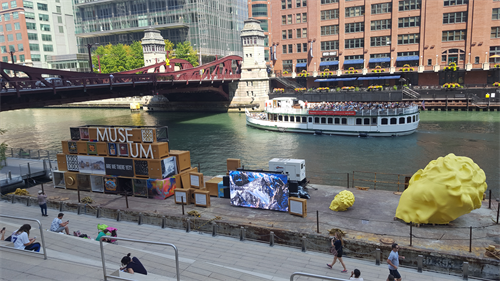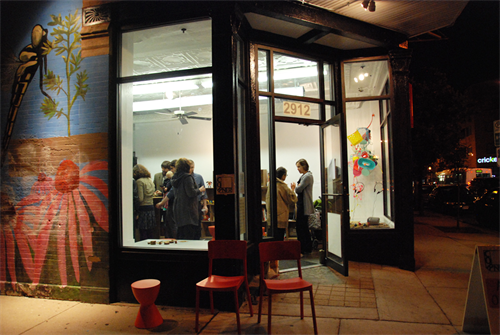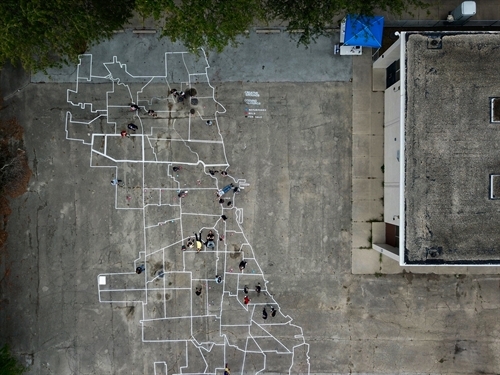Panelists challenged the audience to think beyond economic investment and to consider how leveraging cultural capital, the built environment and community relationships strengthens Chicago neighborhoods.

Photo illustration courtesy of Kaitlin Cernak
 By Ryn Osbourne and Kaitlin Cernak; edited by Liz Granger
By Ryn Osbourne and Kaitlin Cernak; edited by Liz Granger - August 8, 2018
Tweet this
Guests in MPC’s conference room don’t often shout at the top of their lungs. But Tiff Beatty, poet and founder of Art is Bonfire, a fire-inspired monthly ritual featuring pyro-poetry, yelled, paced the room, and locked eyes with guests at our Urban Think & Drink last week. Beatty moderated the arts-focused event, but first, she treated the crowd to a spoken word performance.
“Identity, Identity, Identity!” Beatty erupted, jarring audience members into silence. “Would you burn for your sins, would you burn for your people, would you burn if there was a chance they would have to treat us all equal?”

Artist panelists (from left to right) Faheem Majeed, Lynn Basa, Paola Aguirre and Tiff Beatty shared their projects and discussed how the arts contribute to equitable and vibrant cities.
On Thursday, August 2nd, newcomers and loyal supporters alike gathered at MPC’s latest Urban Think & Drink: Creativity, Arts and Economic Vitality. Presenters included three esteemed Chicago cultural leaders: artist Faheem Majeed of the Floating Museum, a collaborative arts organization that creates temporary, site-responsive museum spaces; artist Lynn Basa, founder of The Corner Project, a community gathering and exhibition space in Chicago’s Avondale neighborhood; and architect and urban designer Paola Aguirre, founder of Borderless Studio, an interdisciplinary urban design consultancy which utilizes design to promote vibrant communities.
Panelists discussed how artists build neighborhood vitality and equity, citing their own practices. Aguirre’s Borderless Studio's Creative Grounds project activates the vacant Anthony Overton Elementary School in Bronzeville through collaborative design, celebrating the site’s legacy and reimagining its identity. Basa’s Corner Project in Avondale is building a network of artists and stakeholders to promote the corridor’s assets and reduce vacancies. And Majeed’s Floating Museum project floated a giant, neon-yellow bust of Jean Baptiste Point DuSable, Chicago’s underappreciated first settler, down the Chicago River, bringing cultural assets to new venues. Each speaker illustrated the power of the arts to tap into the City’s legacy and create new platforms for engaging with the arts.

Faheem Majeed, Floating Museum
The over-sized head of Jean Baptiste Point DuSable was an element of the Floating Museum's exhibition on the Chicago River.
DuSable, the Haitian-French founder of Chicago, is underappreciated among Chicagoans. That’s why Majeed and The Floating Museum were inspired to send a massive DuSable bust down the river on an industrial barge from the South Side to downtown. Transforming the Chicago River, its nearby parks and the Riverwalk into a platform for discussion on geography and access to resources, the Floating Museum created a literal movement towards equitable cultural asset distribution. DuSable’s grandiose head currently lives at Dusable Park, a site dedicated as a park thirty years ago that has yet to be developed. The bust serves as a temporary monument on the otherwise empty site. The work of the Floating Museum has taken significant negotiation: “Our artwork is actually thinking about the ‘no’ that comes from gatekeepers, that’s where our art starts,” Majeed expressed.

Lynn Basa, The Corner Project
The Corner Project storefront in Chicago's Avondale neighborhood serves as community gathering and exhibition space.
Lynn Basa, founder of The Corner Project, located on Milwaukee Avenue between Kimball Avenue and Central Park Avenue in Avondale, saw that the working-class neighborhood could preserve its assets and direct its own future through collaborative action. The building that now houses The Corner Project was once a sausage shop on a bustling mom-and-pop storefront-lined street; this Main Street character remains today. Basa sees herself and other artists the connective tissue that can help define a shared community vision, and in that spirit she established the Milwaukee Avenue Stakeholders Alliance (MASA). A current collaboration of The Corner Project and MASA is a pop up market at Woodard Plaza.

Creative Grounds, Borderless Studio
Creative Grounds Ftransformed the parking lot of Anthony Overton Elementary School in Bronzeville into a map of Chicago Public School closings.
The closing of forty Chicago public schools was a “wake-up call” for Paola Aguirre, whose planning practice focuses on the future of social infrastructure. In partnership with community members, art teachers, students, and community groups, Aguirre’s project, Creative Grounds, enlivens Bronzeville’s Anthony Overton Elementary School filling the empty building with models, maps and installations made by high school students exploring the meaning of education in their community. Aguirre and her collaborators also used paint and stencils to transform the school’s entire parking lot into a large-scale map [LG11] of Chicago showing the location and status of Chicago Public School closings. The map brings site-specific awareness to how resources are inequitably distributed in the Chicago.
Closing out the conversation, Beatty dug into the meaning of economic vitality, asking panelists, “Does art save lives?” Panelists challenged the audience to think beyond economic investment and to consider how leveraging cultural capital, the built environment and community relationships can strengthen Chicago neighborhoods.
We at the Metropolitan Planning Council are excited to continue the conversation about arts and economic vitality at our Annual Luncheon on September 12th, “The Creativity Factor, How Arts and Culture Impact Communities.” Our keynote speaker, Lonnie G. Bunch III, founding director of the Smithsonian’s National Museum of African American History and Culture and former president and director of the Chicago History Museum, will discuss how history and culture are essential to a vibrant community and healthy economy. Join us!
Kaitlin Cernak is Marketing and Communication Intern at Metropolitan Planning Council and Master in Urban Planning and Policy candidate at University of Illinois at Chicago.
Ryn Osbourne is an artist and arts administrator working to support equitable community development through fundraising. She recently earned a Masters in Arts Administration and Policy from SAIC and is currently an intern in development with MPC.